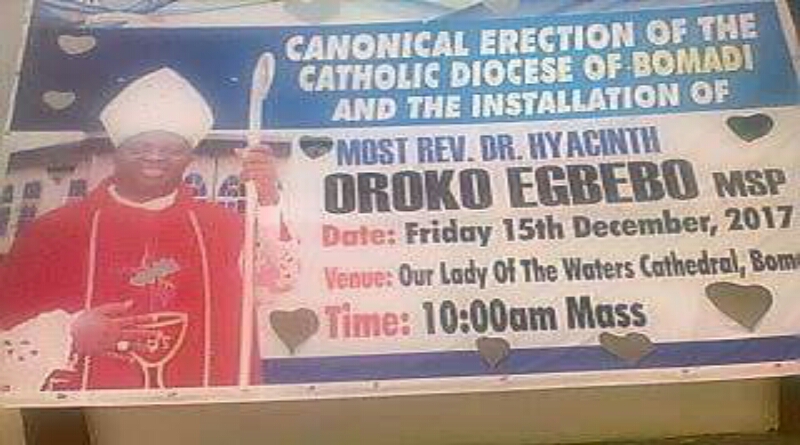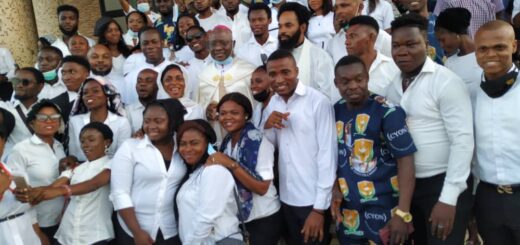Becoming the Eucharist We Celebrate
by ARCH BISHOP · June 19, 2022
Corpus Christi/Abuja Archdiocesan Eucharistic Congress, June 19, 2022, at St. Aloysius Parish, Mpape. Homily by Archbishop I. A. Kaigama
Readings: Gen. 14: 18-20; Ps. 109(110): 1-4; 1 Cor. 11: 23-26; Lk. 9: 11-17
Becoming the Eucharist we celebrate
Abraham’s act of thanksgiving in today’s first reading from Genesis 14 prefigures the Holy Eucharist. Melchizedek, the king of Salem, a figure of Christ and the priests of the New Covenant, offered bread and wine instead of sacrificial animals, and gave thanks to God for giving Abraham victory in war. The Eucharist (Mass) in the Catholic Church is about thanksgiving for gifts that we have received from God both spiritual and physical: good health, freedom, food and drinks, the gift of one another, and above all, the gift of Jesus. The Mass therefore remains the most appropriate place and the best form of thanksgiving we can offer to God. In the second reading, St. Paul recounts the institution and tradition behind the sacrament of the Eucharist. In the Gospel, we read about the feeding of the five thousand with five loaves of bread and two fish. We do get spiritually satisfied whenever we partake of the Eucharist, the source and summit of ecclesial life, which increases our faith and strengthens our hope of eternity with God.
Our Archdiocesan Eucharistic Congress taking place today at St. Aloysius Parish, Mpape (thanks to Fr. Felix Anih and his parishioners and Fr. Vincent Ogunsoro, Chairman of the Pastoral and New Evangelization Commission), is a prelude to the celebration of our Provincial Eucharistic Congress in September, before the National Eucharistic Congress in Benin City in November. Many today will receive their first Holy Communion, while a couple of hundreds will be confirmed. For us Catholics, the Eucharist is the world’s greatest medicine. It is our most treasured food that enables us to “come into union” with Christ and with one another (cf. 1 Cor 1:9).
“Becoming the Eucharist we celebrate: a call to live as one and to serve the ‘weak’” is the theme chosen for the National Eucharistic Congress. Through the frequent reception of the Eucharist and constant adoration of Jesus in the Blessed Sacrament, we are drawn closer to God to feel the warmth of His presence and challenged to transmit such warmth to each other. “Becoming the Eucharist we celebrate” means that we allow Christ penetrate the innermost part of our being, making us instruments of peace, unity and love, and therefore fulfilling the prayer of Jesus, “that they may be one” (Jn. 17:21). The feast of Corpus Christi instituted in 1264 by Pope Urban IV is meant to ease our doubts and confirm our faith in the sacrament of the Holy Eucharist (cf. CCC 1376).
Lessons for today:
If not for reason of a very serious sickness or where attending Mass is practically impossible, a Catholic must attend Mass in person every Sunday, and not by watching it on television or listening to it on radio.
We must not take communion as snacks with no spiritual preparation (confession etc). Some Catholics come very late and go straight to receive communion, and some leave the Mass after communion! If a priest comes late to Mass he cannot just approach the altar and join the other priests or leave the Mass anyhow.
In our turbulent, noisy and violent world, Eucharistic adoration is very highly encouraged. I commend those parishes which have formed the habit of early morning Eucharistic adoration and Benediction on Thursdays or Sundays.
The Mass is not a mere “service”. It is where Christ is sacramentally present under the form of bread and wine.
Priests should not allow the Mass to become an occasion for drama, exaggerated inculturation or utterances that are purely political or mundane. People come to Jesus at Mass to get spiritually nourished by the word and the bread of life and refreshed for the long, rough and tough journey to heaven.
When announced at Mass that Holy Communion is for practising Catholics only, it is not a case of discrimination against non-Catholics. It is because only Catholics believe that the words of consecration pronounced by the priest change the bread into the true body and true blood of Christ (transubstantiation) by the power of the Holy Spirit. We pray for Eucharistic unity among Christians.
If the first and second readings today remind us that the Eucharist is a sacrifice, the Gospel reminds us that it is a meal of love, where we share the one bread and the one cup. If so, we cannot engage in ethnic/clannish fights or discrimination, corruption or immorality. The body of Christ we take should fill us with love, joy, peace, gentleness, goodness, faith, meekness, and temperance (cf. Gal. 5:22).
The Eucharist is a sacrament of healing. Pray and wait patiently and expectantly, but do not time God or expect instant and dramatic results.
Other than physical healing, there is a very great need for inner healing. A sad chapter in our history as a nation which calls for the healing of memory is the unfortunate civil war which still fills many with very sad memories that are a challenge to social cohesion in the country. After over 55 years, the Northerners (Hausas?), Ibos, Yorubas and others need healing and purification of memory. We must all admit that the war was wrong and immoral and should have never been fought, and we must transcend prejudices, stereotypes and barriers to build bridges of love and peace. Our major preoccupation during this season of politics should be to search and elect only credible and capable political leaders who can unite us beyond the narrow confines of tribe and religion.
By believing in the presence of Jesus in the Eucharist, our pathological fear of witches and evil spirits should diminish. When confronted with sickness, childlessness or material deprivation, we should not rush to soothsayers or even to some so-called men of God who may not be any different from deceptive fetish agents.
Approved Catholic “adoration centres” in Nigeria should really be for adoring Jesus in the Blessed Sacrament, not where to intimidate, manipulate and extort people or where a priest attempts to create a personality cult by careless and insensitive utterances and drama.
Brothers and sisters, let us show in our actions that the Eucharist has made a difference in the way we see, do or say things. Let us become what we receive.




